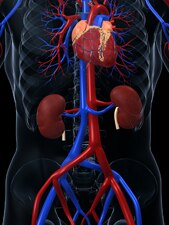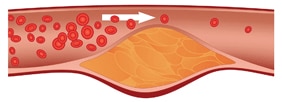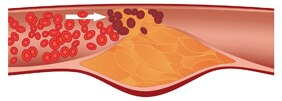Heart Disease & Kidney Disease
On this page:
- If I have kidney disease, why should I learn about heart disease?
- What is kidney disease?
- What is heart disease?
- How are kidney disease and heart disease related?
- Who gets kidney disease?
- Who gets heart disease?
- What are the tests for kidney disease?
- What are the tests for heart disease?
- How are kidney disease and heart disease treated?
- How can I prevent kidney disease and heart disease?
- Eating, Diet, and Nutrition
- What should I ask my doctor about kidney disease and heart disease?
- Points to Remember
- Clinical Trials
If I have kidney disease, why should I learn about heart disease?
If you have kidney disease, you are more likely to get heart disease. Heart disease is the most common cause of death among people who have kidney disease. However, learning about kidney disease and heart disease can help you find ways to stay healthy.

What is kidney disease?
Kidney disease means that the kidneys are damaged and can’t filter blood as they should. This damage can cause wastes to build up in the body. For most people, kidney damage occurs slowly over many years. This gradual loss of kidney function is called chronic kidney disease (CKD).
Most patients with CKD have no symptoms until kidney damage is advanced. After many years, you may start to feel sick or tired all of the time. Kidney failure is when you need a kidney transplant or a blood filtering treatment called dialysis to stay alive. Before you reach that stage, other health problems may develop. One of these problems is heart disease.
What is heart disease?
Heart disease includes any problem that keeps your heart from pumping blood as well as it should. The problem might start in your blood vessels or your heart. Heart and blood vessel problems include
- the buildup of a substance called plaque in the walls of the blood vessels
- a blood clot that blocks the flow of blood to the heart
- heart attack—heart damage caused by a lack of blood and oxygen to the heart
The buildup of plaque is often the first step in making other problems. Plaque can block blood flow.

|
Normal blood vessel |

|
Blood vessel with plaque |

|
Blood vessel with plaque and blood clot |
The early symptoms of plaque in your blood vessels include
- pain in your chest, called angina
- pain in your legs when walking
- sudden numbness or weakness in your arms or legs
- temporary signs of a stroke—a blockage of blood to the brain—such as having a hard time speaking or drooping muscles in your face
- feeling dizzy at times
A blood clot may form in a blood vessel that carries blood to the heart muscle. Then your heart muscle does not get the oxygen and nutrients it needs from the blood. The muscle becomes damaged. The damage to your heart caused by this blockage and lack of oxygen is called a heart attack.
Each person may have different heart attack symptoms. Symptoms can include
- chest pains or discomfort, or often a sense of chest pressure
- pain or discomfort in one or both arms—often the left arm—or in the back, jaw, neck, or stomach
- shortness of breath
- heavy sweating
- nausea or vomiting
- light-headedness
Women may not have chest pain. However, women may be more likely to have shortness of breath, nausea, or back and jaw pain.
If you have any of these symptoms, call 911 right away. You can start getting treatment in the ambulance on your way to the emergency room.
How are kidney disease and heart disease related?
Kidney disease and heart disease share two of the same main causes:
Diabetes
If you have diabetes, you have too much glucose, also called sugar, in your blood. Too much glucose in your blood for a long time can damage many parts of your body, including your heart and kidneys. More information is provided in the following NIDDK health topics:
High Blood Pressure
Blood pressure is the force of your blood pushing against the walls of your blood vessels. With high blood pressure, your heart works harder to pump blood, which can strain your heart. High blood pressure can damage your blood vessels. If high blood pressure damages the small blood vessels in your kidneys, your kidneys will not filter your blood as well as they should.
Blood pressure is written as two numbers separated by a slash. A doctor will say a blood pressure reading of 120/80 as “120 over 80.” The top number represents the force of blood pressing against the blood vessel walls when the heart is contracting. The bottom number represents the pressure when the heart is at rest between contractions. You should keep your blood pressure below 140/90 unless your doctor sets a different goal. Controlling your blood pressure can help protect your heart and kidneys.
High blood pressure is not only a cause of kidney disease; kidney disease is also a cause of high blood pressure. When you have damaged kidneys, they may be unable to filter extra water and salt from your body. The high blood pressure that results can then make kidney disease worse. Worsening kidney disease can raise blood pressure again. A dangerous cycle results as each disease makes the other worse. More information is provided in the NIDDK health topic, High Blood Pressure and Kidney Disease.
Who gets kidney disease?
You are more likely to develop kidney disease if you have
- diabetes
- high blood pressure
- heart disease
- lupus
- a family member who has kidney failure
African Americans, Hispanics/Latinos, American Indians, and Alaska Natives are also more likely to develop kidney disease.
Who gets heart disease?
You are more likely to develop heart disease if you have
- high blood pressure
- high blood cholesterol, a blood fat
- diabetes
- kidney disease
- a family history of early heart disease
You are also more likely to develop heart disease if you
- smoke
- eat a diet high in the wrong kinds of fats
- have too much sodium—often from salt—in your diet
- are overweight
- don’t exercise
- are a man age 45 or older
- are a woman age 55 or older
What are the tests for kidney disease?
Tests for kidney disease include a blood test and a urine test. Both tests can be done in your doctor’s office or at a commercial facility.
- The blood test checks your GFR, which tells how well your kidneys are filtering. GFR stands for glomerular filtration rate.
- The urine test checks for albumin in your urine. Albumin is a protein that can pass into the urine when the kidneys are damaged.
If these tests show you have kidney disease, you may need to repeat these tests on a regular basis. More information is provided in the NIDDK health topic, Testing for Kidney Disease.
What are the tests for heart disease?
You can get several routine tests for heart disease in your doctor’s office or at an outpatient center, including
- a blood pressure test
- a blood test for cholesterol
- an electrocardiogram—a test using sensors stuck to your skin to record the electrical signals that keep your heart beating
Another test, called a stress test, measures how your heart works during physical activity, such as walking, running on a treadmill, or riding a bike. This test usually takes place in a hospital or a specialized outpatient center.
If these tests show that you have heart disease, your doctor may want to do more tests.
How are kidney disease and heart disease treated?
If you have kidney disease or heart disease, your health care provider will want you to control your blood glucose if you have diabetes and your blood pressure if you have high blood pressure. Your health care provider may prescribe medicines to keep your blood glucose and blood pressure under control. Medicines for blood glucose control can include insulin injections and pills. Certain medicines for blood pressure may also keep your kidney disease from getting worse.
Another important part of treating kidney disease and heart disease includes living a healthy lifestyle. Staying active can help protect your kidneys and your heart. Try to be active for 30 minutes or more most days of the week. Start with easy activities such as walking slowly or raking leaves. Later, try some activities that get your heart pumping, such as walking briskly or swimming. Always talk with your health care provider before starting any new exercise program. You can find more information about about weight control and physical activity at NIDDK's Weight Control Information Network. See the “Eating, Diet, and Nutrition” section below for tips on eating a healthy diet that will protect your heart and kidneys.
How can I prevent kidney disease and heart disease?
You cannot always prevent kidney disease and heart disease. However, you can lower your chance of having kidney disease and heart disease by taking the following steps:
- See your health care provider as directed.
- Keep your blood pressure below 140/90. Follow your provider’s advice on how to stay at or below your target.
- Control your blood glucose if you have diabetes.
- Have your blood and urine checked as your provider instructs.
- Try to keep your cholesterol numbers in a healthy range. Talk with your provider about your cholesterol goals.
- Control your weight. If you are overweight, talk with your provider about how you can lose weight.
- Be physically active 30 minutes a day most days of the week.
- Take all medicines as prescribed.
- Eat healthy—see “Eating, Diet, and Nutrition.”
Eating, Diet, and Nutrition
A healthy diet can help protect you from heart disease and kidney disease. Keep your heart and kidneys healthy by eating plenty of the following foods:
- fruits and vegetables
- whole-grain breads and cereals
- low-fat milk and milk products such as yogurt and cheese
- lean meats or meat substitutes such as tofu
- fish
- unsaturated fats such as olive oil or corn oil
- low-sodium foods
People with advanced chronic kidney disease may need to adjust their diet to avoid high potassium. If you have advanced kidney disease, you may need to limit foods such as bananas, oranges, potatoes, and tomatoes and eat apples, berries, grapes, and peaches instead. Check with your provider to find out if you should cut back on your potassium. Do not alter your diet without checking because you might eat less of these healthy fruits and vegetables unnecessarily.
More information is provided in the NIDDK health topic, Potassium: Tips for People with Chronic Kidney Disease.
You need protein. However, protein breaks down into wastes that your kidneys need to remove. Most people eat more protein than they need. Large amounts of protein make your kidneys work harder. High-quality proteins such as meat, fish, and eggs make fewer wastes than other sources of protein. Beans, whole grains, soy products, nuts and nut butters, and dairy products can also be good sources of protein.
More information is provided in the NIDDK health topic, Protein: Tips for People with Chronic Kidney Disease.
Phosphorus is a mineral that helps keep your bones healthy. Phosphorus also helps blood vessels and muscles work. Phosphorus is found naturally in foods rich in protein, such as meat, poultry, fish, nuts, beans, and dairy products. Phosphorus is also added to many processed foods. When you have kidney disease, phosphorus can build up in your blood, making your bones thin, weak, and more likely to break. Many people with kidney disease need to eat foods with less phosphorus than they are used to eating.
More information is provided in the NIDDK health topic, Phosphorous: Tips for People with Chronic Kidney Disease.
Sodium is a part of salt. Sodium is found in many canned, packaged, and “fast” foods. Sodium is also found in many seasonings and meats. You should limit the amount of sodium you get to 2,300 mg or less each day.
More information is provided in the NIDDK health topic, Sodium: Tips for People with Chronic Kidney Disease.
A dietitian is a health care provider who helps people with kidney disease choose the right foods and plan healthy meals. Talk with a dietitian about foods that might harm you and foods you should add to your diet.
More information is provided in the NIDDK health topic, Eating Right for Kidney Health: Tips for People with Chronic Kidney Disease.
What should I ask my doctor about kidney disease and heart disease?
Some questions to ask your doctor include
- What is my blood pressure? What should it be?
- How often should I have my blood pressure checked?
- Should I be taking medicines to control my blood pressure?
- Should I be on a special diet?
- What are my cholesterol numbers? What should they be?
- How much exercise should I be getting?
- Where can I get help to quit smoking?
Points to Remember
- If you have kidney disease, you are more likely to get heart disease. Heart disease is the most common cause of death among people who have kidney disease.
- Kidney disease means that the kidneys are damaged and can’t filter blood as they should. This damage can cause wastes to build up in the body.
- Heart disease includes any problem that keeps your heart from pumping blood as well as it should. The problem might start in your blood vessels or your heart.
- Tests for kidney disease include a blood test and a urine test.
- You can get several routine tests for heart disease in your doctor’s office or at an outpatient center, including
- a blood pressure test
- a blood test for cholesterol
- an electrocardiogram
- a stress test
- If you have kidney disease or heart disease, you will want to control your blood glucose if you have diabetes, and your blood pressure if you have high blood pressure.
- You can lower your chance of having kidney disease and heart disease by taking the following steps:
- See your health care provider as directed.
- Keep your blood pressure below 140/90. Follow your provider’s advice on how to stay at or below your target.
- Control your blood glucose if you have diabetes.
- Have your blood and urine checked as recommended.
- Try to keep your cholesterol numbers in a healthy range.
- Control your weight. If you are overweight, talk with your provider about how you can lose weight.
- Be physically active 30 minutes a day most days of the week.
- Take all medicines as prescribed.
- Eat healthy.
- You should limit the amount of sodium you get to 2,300 mg or less each day. Sodium is a part of salt.
Clinical Trials
The National Institute of Diabetes and Digestive and Kidney Diseases (NIDDK) and other components of the National Institutes of Health (NIH) conduct and support research into many diseases and conditions.
What are clinical trials, and are they right for you?
Clinical trials are part of clinical research and at the heart of all medical advances. Clinical trials look at new ways to prevent, detect, or treat disease. Researchers also use clinical trials to look at other aspects of care, such as improving the quality of life for people with chronic illnesses. Find out if clinical trials are right for you.
What clinical trials are open?
Clinical trials that are currently open and are recruiting can be viewed at ClinicalTrials.gov.
This content is provided as a service of the National Institute of Diabetes and Digestive and Kidney Diseases
(NIDDK), part of the National Institutes of Health. NIDDK translates and disseminates research findings to increase knowledge and understanding about health and disease among patients, health professionals, and the public. Content produced by NIDDK is carefully reviewed by NIDDK scientists and other experts.
The NIDDK would like to thank:
Lawrence Appel, M.D., Johns Hopkins University Medical Institutions; Brian Testerman and Vicki McClelland, Free Medical Clinic of the Northern Shenandoah Valley

